We are often asked how to use a Tibetan mala or Tibetan prayer beads. We hope this blog post will answer some common questions about Tibetan malas.
Through the Tibetan Nuns Project online store, we sell long malas and wrist malas made and blessed by Tibetan Buddhist nuns at Dolma Ling Nunnery.
What are Buddhist prayer beads?
Malas or Tibetan Buddhist prayer beads are similar to other prayer beads used in various world religions. Some people have called the mala a Buddhist rosary, but in Tibetan, a mala is called a threngwa (Tibetan ཕྲེང་བ). Mala is a Sanskrit word meaning “garland”. Malas are used to keep track while one recites, chants, or mentally repeats a mantra or the name or names of a deity. Malas are used as a tool to keep count of mantra repetitions. Mantras are spiritual syllables or prayers and are usually repeated many times.
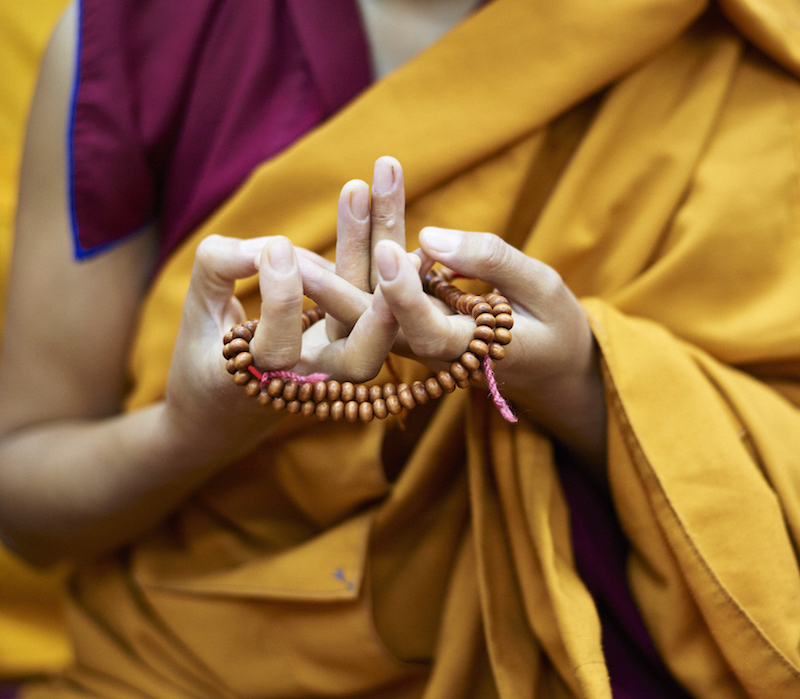
A Tibetan Buddhist nun performs the Mandala Mudra with her mala (Buddhist prayer beads). Photo courtesy of Olivier Adam
How are malas used?
Malas are used to help focus one’s awareness and concentration during spiritual practice. Long malas, as opposed to the shorter wrist malas, have 108 beads. The summit or head bead is called the guru bead or a sumeru. In Tibetan Buddhism, one mala constitutes 100 recitations of a mantra. There are 8 additional recitations done to ensure proper concentration.
What is the meaning of a guru bead?
In Tibetan Buddhism, people traditionally use malas with 108 counting beads and a special, three-holed, finishing bead called a “guru” bead or “Buddha” bead. Often the 108-bead malas have additional marker beads that may or may not be counted and that divide the mala into quadrants, constituting 108 counting beads all together.
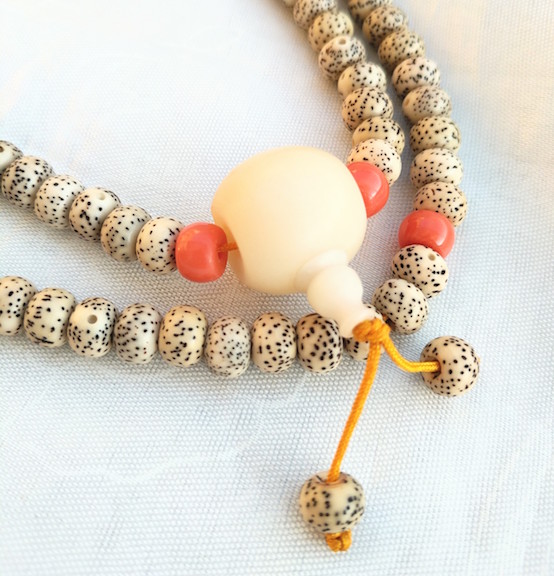
A long Tibetan mala from the Tibetan Nuns Project collection showing the guru bead. The guru bead has three stringing holes and here also has a smaller tower-shaped bead that holds the ends of the string.
The guru bead represents the relationship between the student and the guru or spiritual teacher. To use the mala, you start counting from the bead next to the guru bead. When you reach the guru bead again, it signifies the end of one round in the cycle of mantras.
Once you have completed a full circuit of the mala and reached the guru bead again, you reverse direction by flipping your mala. Then you continue again in reverse order. Most people believe that you do not cross over the guru bead as a sign of respect towards one’s spiritual teachers.
How do you hold and use a mala or prayer beads?
The mala is held with gentleness and respect, generally in the left hand. To use your mala, hold it with your left hand and begin to recite from the guru bead, clockwise around the mala, using your thumb to move the beads. Count one bead for each recitation of the mantra. The first bead is held between the index finger and thumb, and with each recitation of the mantra move your thumb to pull another bead in place over the index finger.
Why is the number 108 sacred?
The number 108 is sacred in many Eastern religions including Buddhism, Hinduism, and Jainism. In Tibetan Buddhism malas or rosaries are usually 108 beads plus the guru bead, reflecting the words of the Buddha called in Tibetan the Kangyur in 108 volumes.
How to care for your mala
Malas are sacred objects believed to be charged with the energy of the deity. They should be treated with great reverence.
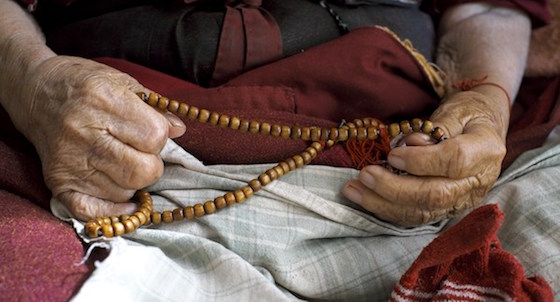
An elderly nun at Geden Choeling Nunnery in Dharamsala, India gently holds her Tibetan mala. Photo courtesy of Brian Harris
As with all sacred objects, such as books and other spiritual instruments, one should keep malas off the ground. If your mala accidentally lands on the ground, you should touch it to the crown of your head and recite the sacred syllables Om Ah Hum, three times.
The mala should not be worn while bathing, or allowed to get wet, as this may weaken the cord on which the mala beads are strung. It is best to remove your mala before going to sleep so that you do not accidentally stress the cord and break it.
The nuns at Dolma Ling Nunnery and Institute also make and sell mala bags so that malas can be carefully protected.
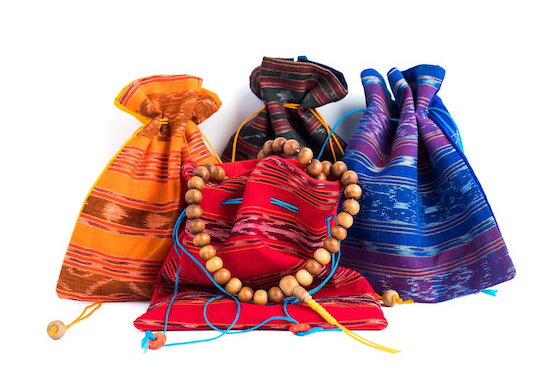
A selection of mala bags made by the nuns at Dolma Ling Nunnery. Our online store has a wide range of bags made from different fabrics and in different colors.
Choosing a Mala
You don’t have to be a Buddhist to wear a mala. The Tibetan Nuns Project has different kinds of long malas, each hand strung, knotted, and blessed by nuns at Dolma Ling Nunnery and Institute near Dharamsala in India. They are made from materials such as semiprecious stones, sandalwood, and bone and they range in price from $15 to $45.
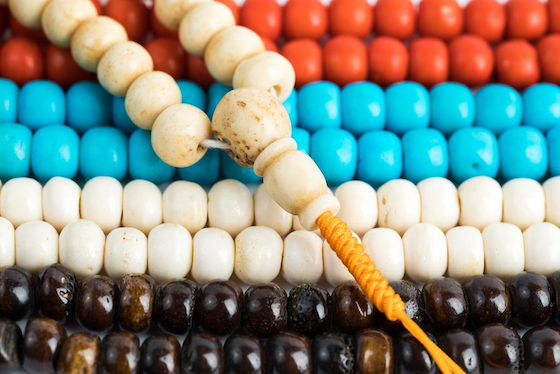
Assorted Tibetan Buddhist bone malas from the Tibetan Nuns Project
Long malas can be worn as a necklace or wrapped around your wrist. By purchasing these malas, you help provide the nuns with food, shelter, education, and health care – something you can feel great about every time you use your mala.
Our online store also has many types of wrist malas too, ranging in price from $11 to $22, and also made and blessed by the nuns at Dolma Ling. The wrist malas are approximately 6 inches (15 cm) in diameter and strung on elastic to fit most wrists.
Types of Malas
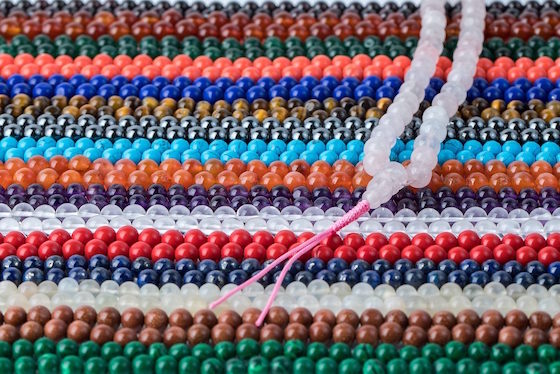
Our online store sells dozens of types of wrist and long malas, made of wood, bone, and semi-precious stones like amethyst, garnet, jade, and lapis.
Here’s a list of some types of malas and their special properties:
Amethyst is the stone of spirituality and contentment. It balances the energy of one’s intellectual, emotional, and physical bodies.
Garnet enhances internal fire and brings about creative power. It is helpful during feelings of abandonment and brings freshness to one’s life.
Granite helps with balance in relationships, fosters cooperative efforts and facilitates diplomacy. It helps increase wealth while allowing the recipient to remain modest.
Jade assists in dream analysis and grants the user a long and fruitful life. It helps with the transition from this body to the spiritual world.
Lapis provides objectivity, clarity, and mental endurance during times of realizing emotions. It also helps with creativity, organization, and with easing depression.
Malachite creates an unobstructed path leading to a desired goal and helps the user accept responsibility for actions and circumstances.
Moonstone fosters balance, introspection, and reflection. It helps deal with emotional, mental, physical, and spiritual changes, and helps in recognizing “ups and downs”.
Quartz amplifies body and thought energy. It also brings the energy of the stars to the body.
Rose quartz creates harmony and self-love during chaotic situations. It is the stone of gentle love and brings peace to relationships.
Sandstone builds and strengthens relationships and/or groups. It provides insight into deceit and encourages truth.
Tiger eye brings about clarity when dealing with scattered intellectual fragments. This stone is practical and grounding.
Turquoise heals the spirit with soothing energy and provides peace-of-mind. It holds both spiritual and protective properties, and balances the male and female aspects of one’s character.
Buying Mala Beads
The nuns buy from local Indian or Tibetan vendors for their beads. The beads are then hand strung and knotted into mala form. Once complete, the malas are then blessed by the nuns. We try to keep our prices reasonable so that our prayer beads can be accessed by everyone.

I am happy when I have been giving the meaning of the Malas.
Greetings:
Curious to know the history of the Nguyen name as I learned I am a relative to Nguyen and have no idea how.
2nd question: the prayers that are said with the Malas… can you lead me to a online sight English transliteration that I may read and understand the prayers?
Dear Carol, you might enjoy this blog post about the meaning of the mantra Om Mani Padme Hum. https://tnp.org/the-meaning-of-om-mani-padme-hum/
Would it be ok to rub a little blessing oil on my sandalwood mala
Yes, that wouldn’t be a problem, though it will likely darken your mala. Generally the sandalwood malas worn absorb oil from people’s skin over time and usage and they get a bit of a patina. Thank you so much for supporting the nuns through your mala purchase. Warmest wishes to you.
I bought some brand made antique looking beds just as a necklace. I was told they were Tibetan prayer beads. Is there anything wrong with wearing them as just a piece of jewelry.
Hello Angie, As you wear the beads as a necklace they can be a reminder of wisdom and compassion. You can wear them with the intention of wishing to end the suffering of all sentient beings.
Am I suppose to remove mala while eating non-veg ?
There’s no need to remove your mala, Emerald.
I purchased a prayer bead set that I believe is a mala. It has two additional strands of smaller beads (10) and 1 bead at each end. O can feel the Divine energy and appreciate the info provided at this site. Thank you 🙂
Thank you, Virginia. You are so welcome. <3
Thank you for all you do
Is it proper to have a tattoo of prayer beads, and if so, should it be placed in a particular location on the body?
Dear Wells, There would not be an official position, since such tatooing is a relatively new phenomenon. However, in general, the purpose of prayer beads is to turn them while reciting mantras or prayers, and hence it seems that having them tattooed on the body would rather defeat their intended purpose. If they are meant to be purely decorative, there is probably no harm in tattooing them, though they should be on the upper part of the body.
I’m not from the Tibetan tradition, but use a mala. How is it used differently in the Tibetan tradition, as what is written is how it is used in other traditions, as well.
Hello I bought a pretty Tibet oxen homemade bone n skull rosary bead necklace. I want to use it but I don’t know how I have been using it as a normal rosary necklace. What are the proper prayers to use.
Dear Emmanuel, You could start with the 6-syllable mantra, Om Mani Padme Hum. Here’s a blog post about its power and meaning: https://tnp.org/the-meaning-of-om-mani-padme-hum/
Thank you. Many blessings!
Spirit of humanity
I want to chant mantra, Om Mani Padme Hum. which rosary would be suitable for this. Kindly answer it.
You can use any kind of mala.
Do your wrist Malays have 27 beads?
Thank you for your question, Brian. Our wrist malas vary with the number of beads. We receive the malas as they come from the nuns. If you have a specific request contact our office and we are happy to try to find one, but unfortunately there is no guarantee.
Greetings. My understanding on how to hold the mala beads and move them along is that you don’t use your index finger as this represents the ego. In your explanation, it says the beads are held between the index finger and thumb. Can you please advise me on this. Thank you
Dear Mavis, Thank you for your question. There will be some variation between different Buddhist traditions and even different Buddhist teachers. The general rule of thumb is that you hold the mala in your left hand, generally draped over the index finger, and you pull the beads towards you with your thumb (with some saying the symbolism is of pulling being upwards from samsara). That is the most common way that it is done.
thanks for your useful post it helped me find out about how helpful it is for our spirituality subscribe to your blog.
I love you.
Thank you for helping to bring compassion into the world.
Om Tara Tuttare Ture Svaha
Is it okay to have many malas? To reflect on different thoughts?
Yes it is totally fine. People do have different malas for different practices.
Many blessings to you as this post was exceptionally enlightening. I have recently started this practice and want to make sure I am following traditional tibetan wisdom. Thank you for spreading your love and wisdom to the world and I look forward to finding more from you.
Fantastic. Thank you
What are specific symbols and their properties? I have a bead with Om on it (A in Tibetan language).
Dear Kathie, you might find this post helpful about the meaning of Om: https://tnp.org/the-meaning-of-om-mani-padme-hum/
I have purchased these as gifts for others in the past to help support the nuns. I was planning on purchasing more since you have more stock.
Is it ok for people to wear them as bracelets?
Dear Belle, Thank you so much for supporting the nuns by purchasing malas for your friends and for yourself. One’s intention is the most important thing when wearing a mala. It is good to look at it and rid one’s mind of negative thoughts and to wish to end the suffering of all beings. Once again, thank you so much for your kindness and compassion.
Thank you for this great information. My mom passed away and I inherited her jewelery. I didn’t know what this gorgeous, heavy, intricate item was. Now I know I’ve been blessed with a sacred and spiritual object of prayer and devotion of a religion I respect with much earnestness and brotherly love.
When I first joined the Catholic church, I very carefully chose the rosaries I purchased, and I cherish their beauty and the peace and love I feel when I use them or even look at them. I am convinced that this one, amazing Mala I have is probably worth more than all of the rosaries I own combined. I’m very honored by this blessing, and pray for blessings to be showered upon your nunnery. May all your prayers be answered, sweet children of God. I hope it’s not offensive to refer to your spiritual leader as God, because I believe we are, indeed, praying to the same One. Thank you, again.
Dear Ace, Thank you for your beautiful message and deepest condolences on the passing of your mother.
Greetings!
I recently purchased a wrist Mala from TNP. The description for the item states it is blessed by the nuns. Would you please tell me what the blessing is?
Thank you and many blessings to you for helping these amazing women on their spiritual journey.
Thank you so much for purchasing a mala! The nuns pray for the safety and happiness of the owners of the items. There is not a specific set of prayers that are for products.
thanks for your useful post it helped me find out about really lovely Post
Pingback: What Do You Say When Using a Mala?
i have just bought a red bone wrist mala i am so looking forward to reciving it as i am just starting my journy